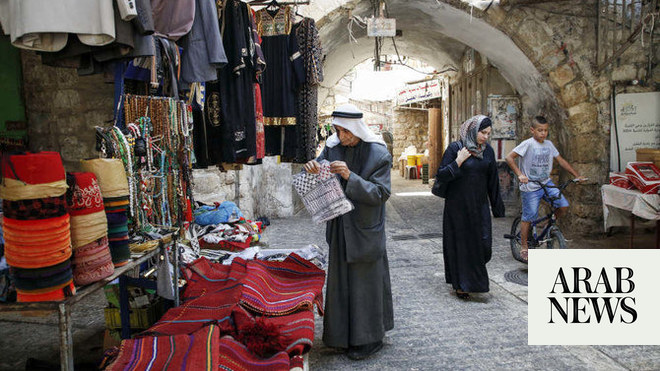
Second wave of infections fueling fears of surge in overcrowded Palestinian refugee camps
BETHLEHEM: Slaughterhouses typically crowded with Palestinian Muslims buying sheep for the annual Eid Al-Adha “feast of sacrifice” were nearly empty this week as coronavirus curbs weigh on the economy in the occupied West Bank.
The Palestinian Authority (PA) has imposed a partial lockdown over areas under its control to battle a surge in new cases, forcing many businesses to close and sending unemployment to an estimated 18 percent.
“Who exactly can afford (sheep) to sacrifice?,” livestock merchant Daoud Ebayat asked at a hillside market in Bethlehem. “People are unable to cover expenses for their children, there’s no work.”
Around 115,000 sheep and 10,000 calves were sold during Eid Al-Adha in the West Bank and in East Jerusalem last year, according to ministry data.
But with many out of work, and public servants on reduced pay as the PA attempts to weather a financial crisis, local officials say sheep sales have plummeted.
“There will be a decrease, some are saying, of about 20 percent or more,” said Tareq Abu Laban, an official at the Palestinian Agriculture Ministry, noting that final figures were not yet available.
In Bethlehem, several dozen customers haggled with merchants at the sparsely crowded market, hoping for a bargain on sheep that Ebayat says sell for around 2,000 shekels ($588) each. The average monthly income in the West Bank is $350.
Many buyers share larger animals, such as cows or camels, with their extended families to manage the cost ahead of the four-day Muslim festival, which begins on Friday.
Eyad Daraghmeh, who runs a slaughterhouse in Al-Bireh, pointed to empty animal pens at his sprawling facility as evidence of Palestinians’ economic hardship.
“These sheds used to be full of livestock and sacrifices, at least 6,000 available for slaughter,” Daraghmeh said. Behind him a lone calf walked around an otherwise empty pen.
SPEEDREAD
In Bethlehem, customers haggled with merchants at the sparsely crowded market, hoping for a bargain on sheep that sell for around 2,000 shekels ($588) each. The average monthly income in the West Bank is $350.
Fawzat Rayyan, a livestock breeder in the northern West Bank city of Nablus, said that by this point in a typical year he would have sold 120 animals.
“This year it is hardly half that number ... the coronavirus is weighing down on us,” he said.
Palestinians have reported 75 deaths and over 10,000 COVID-19 cases in the occupied West Bank, the majority of them in the last two months.
A second wave of infections sweeping the West Bank is fueling fears of a surge in overcrowded Palestinian refugee camps where social distancing is next to impossible.
At the start of the COVID-19 pandemic in March, the Palestinian Authority quickly imposed a lockdown as it sought to contain infections.
But after Israel and later the PA eased restrictions in late April and May, the number of cases rose again, exacerbated by breaches of limits on public assembly and movement.
One major driver has been Palestinian workers going to and from jobs in neighboring Israel, according to the PA.
The Jewish state went into lockdown in mid-March, but after easing restrictions it started reporting 1,000 to 2,000 new coronavirus infections a day and reimposed some restrictions.
The Palestinian Health Ministry’s Tuesday update logged more than 10,860 confirmed cases of infection since the start of the pandemic, including more than 75 deaths.
That compares with an accumulated total of less than 2,700 infections and seven deaths as recently as July 1.
The growing health crisis is causing concern in the camps.
The UN defines about 5 million Palestinians as having refugee status. They are the survivors and descendants of the more than 700,000 who were expelled or fled their land over a few months in 1948 when Israel was founded.












